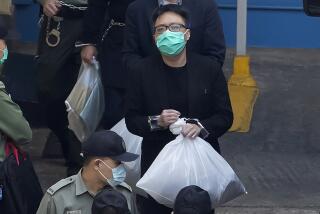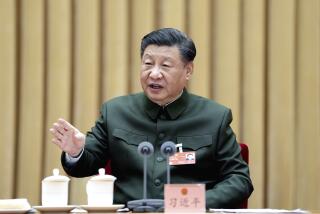JUSTICE WATCH : No Silence for Beijing
- Share via
“Why are they doing this to him?” one Chinese asked after Beijing imposed a 14-year prison sentence on the country’s leading dissident, Wei Jingsheng. “When he was first around in 1979 people were open to criticism of the government. But now, people are living better. They have money and they have hope. He is just one man. Why are they afraid of him?” Good question.
In a one-day trial, a court convicted Wei of attempting to overthrow the government because he advocated democracy and criticized the regime. Beijing’s persecution of Wei has generated condemnation around the world, with the White House decrying what it called the silencing of a democratic voice. Wei has 10 days to appeal.
Beijing’s fixation on Wei is the most obvious evidence of its continuing attempt to squelch China’s small dissident community. The leadership is likely to dismiss the international criticisms as unwarranted intrusions into a domestic matter. But if China is ever to win full acceptance in the world community, it must allow free expression; there is no alternative.
Wei, jailed initially in the late 1970s, was nearly forgotten in China when he was released in 1993, six months short of serving a 15-year sentence. But Beijing continued to harass him, inadvertently publicizing its unjust treatment of him.
For Chinese officials positioning themselves for the power struggle expected to follow the death of ailing leader Deng Xiaoping, Wei did not represent a big threat. But now, again, he has become a symbol of China’s repressive ways.
More to Read
Sign up for Essential California
The most important California stories and recommendations in your inbox every morning.
You may occasionally receive promotional content from the Los Angeles Times.












